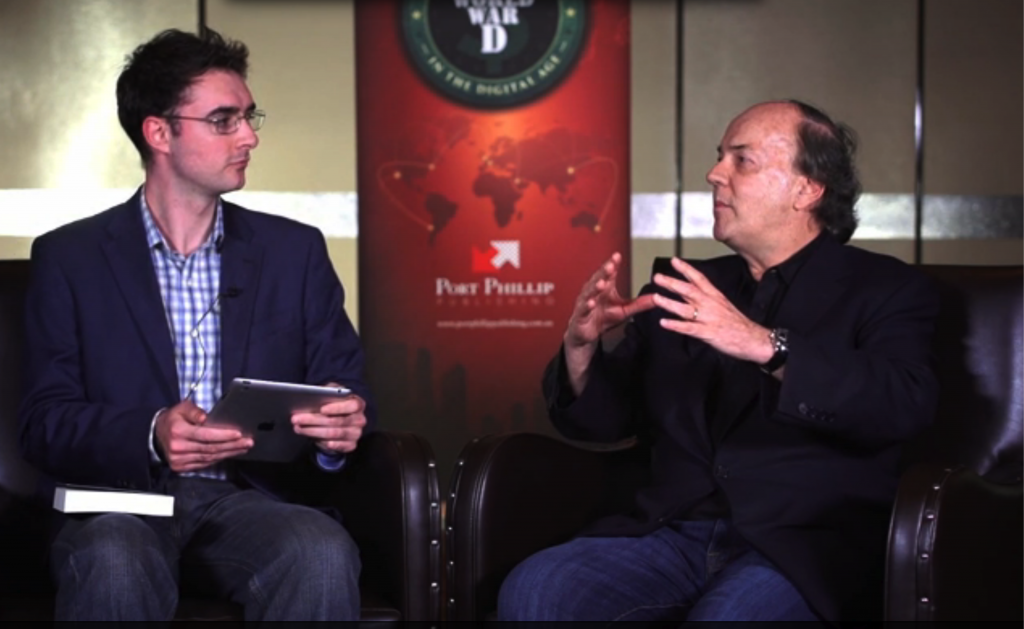"Charm City," Md.
April 29, 2014
 Peter Coyne, filing through the DR's mailbag... Peter Coyne, filing through the DR's mailbag...
The U.S.-Russia financial war is on, says our friend and author of The Death of Money, Jim Rickards.
Like clockwork, a Russian foreign minister responded to the U.S. sanctions yesterday, saying: "A response of Moscow will follow, and it will be painfully felt in Washington, D.C."
This morning, the European Union piled their own sanctions on Moscow too. What the official or unofficial repercussions will be is yet to be seen. But it's very naive to think Russia will turn the other cheek.
We toyed with the possibility of a cyber-retaliation yesterday -- one that could cripple an entire stock market or damage critical U.S. infrastructure. We think (especially after reading Rickards' book) that that's possible. Probable, even.
Some reckoners disagree. Writes one reader, whose message we edited because it was too long to fully reprint:
"Of course the Russians won't do something like that -- they would be hurt too -- in addition, it is the U.S. administration (and prostitute press, Goebbels-style), that are acting aggressively -- not the Russians -- the Russians have shown remarkable low-keyedness and restraint -- unlike the U.S. and its EU puppet states.
"This is no comfy 'armchair strategy' matter. This is dangerous, real dangerous stuff. Your children's future will depend on it. Don't you understand that? This is no camera or TV game. This is reality.
"To simply rely on others having 'cooler heads' to prevail while you yourselves, trying to skim off some dramatic sensationalism from the situation, is not only irresponsible -- it is extremely distasteful. Show some style, decency and responsibility, please."
Uhh... we agree. This is "real dangerous stuff." Cyberattacks aren't an abstract risk you can ignore. That's why we're writing about it.
But frankly, your argument is way off. We're talking about war. It doesn't matter one bit if Russia would be "hurt too" if they launched a financial attack.
"All wars have costs," explains Jim Rickards in The Death of Money, "and many wars are so destructive that recovery takes years or decades. This does not mean wars do not happen or that those initiating them do not find advantage despite the costs."
There's a difference, dear reader, between maximizing financial and economic gains and maximizing economic and geopolitical advantage. Each goal requires a different logic. Jim Rickard's made sure we left Australia last month knowing that.
He drew the distinction by comparing a currency war and a financial war -- two things he's an expert on. As you'll see, mixing one up with the other is like confusing a Korean person with a Chinese person. You make the mistake at your own risk...
For example, Janet Yellen might cheapen the dollar to boost exports. At the same time, the weak currency will increase the price of goods we import too. That will be inflationary, which the Fed likes -- every central bank likes it. And because all nations want the same economic benefits, as soon as one country cheapens its money, it starts a "race to the bottom." All nations begin to devalue their currencies. It's a struggle to gain an added economic benefit. Hence, currency war.

"But financial war is different," Jim told us during an informal chat. "It's the continuation of traditional war by different means.
"Instead of using ships, missiles, drones or whatever, you're using stocks, bonds and derivatives. You're not trying to vie for economic gains you're trying for economic and political advantage.
"The end goal is to hurt your enemies. Damage their infrastructure. Damage their markets. Increase their costs. Increase their interest rates. Tank their currency. It damages the other guy's economy. You basically try to transfer wealth from him to you.
"If you want to defeat the United States," concluded Rickards, "you can't do it militarily. But you might be able to do it economically..."
| 

No comments:
Post a Comment